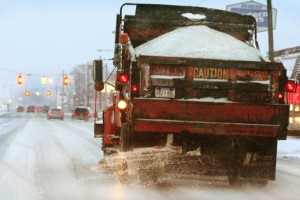
Governments across the Midwest and Northeast are looking for alternatives to rock salt to de-ice roads in winter.
For decades, states in the Midwest and Northeast have fired up thousands of trucks filled with rock salt and sent them out on the roads to combat snow and ice storms, melting both to make roads safer for commuters.
And for decades, vehicle owners dealt with the not-so-pleasant after effects of salt: rust, corrosion and gunk on car’s panels and components that may ultimately cause them to fail. However, there is now another, perhaps more important, reason for finding an alternative to the hundreds of thousands of pounds of salt used annually: the environment.
Researchers are showing that the salinity levels of thousands of lakes, rivers and streams are on the rise and it’s all tied to the use of sale on the roads.
“There has been a sense of alarm on the impacts of road salt on organisms and ecosystems,” Victoria Kelly, a road salt expert at the Cary Institute of Ecosystem Studies in New York, told the Associated Press.
(Study sees California hitting 1.5 million ZEV target by 2025. Click Herefor the story.)
“We’ve seen increasing concentrations in river water, lakes, streams. Then, scientists started asking the question: What is going to happen to the organisms living in freshwater bodies and what will happen to the freshwater bodies as a whole?”
Some communities are taking these concerns to heart and looking for alternatives to rock salt. See something reddish coming out the back the “salt” truck in front of you? Could be beet juice or beet molasses.
In Wisconsin, Polk County is using cheese brine from local dairy companies. The brine is the remnants of the salt baths used in making cheeses like mozzarella or provolone. Normally it’s discarded as a waste product, and it costs money to have it treated off site.
Polk County was in search of ways to reduce the use of rock salt and teamed up with a neighboring dairy operation to take the salty liquid off their hands. Now the county uses up to 30,000 gallons of cheese brine each winter to spray on the roads in a pre-wetting technique. The dairy disposes it for free and the county acquires it for free — a win-win, according to authorities.
(Click Here to see how much new vehicle sales are expected to drop in January.)
Researchers from Drexel University, Purdue University and Oregon State University recently discovered that adding paraffin oil or other “phase change materials” to concrete could one day enable roads to melt snow and ice without salts or chemicals.
Other items they’re trying: sand, molasses, pickle brine, garlic salt, potato juice, coffee grounds and even beer waste. Often these ingredients are mixed with rock salt to reduce the amount of salt used.
The higher concentrations of salt cause a variety of problems for the wildlife in those ecosystems, including smaller and less fish, the destruction of plant life and fewer amphibians, which all change the diversity of the systems.
Despite such environmental concerns, Caleb Dobbins, New Hampshire’s highway maintenance engineer, doesn’t envision salt being replaced anytime soon by substitutes, such as magnesium acetate, which he says are 30 times more expensive and have their own environmental challenges.
(To see more about the new global automotive sales leader, Click Here.)
“Everybody is looking throughout the world,” he told AP. “Nobody is finding that silver bullet.”


The cheese brine is still salt and the molasses probably causes fish gout.
What’s wrong with using sand instead of salt? I believe it’s used extensively in Michigan’s upper peninsula.
Please share this with the Transportation Department of the City of Portland, OR…which recently decided that adding salt its diet was a good idea.
Beet juice doesn’t do anything but cause more accidents. Nothing really beats salt; sand is o.k. but if it has a high-silica content…what was that in physics, friction = zero. If you’re diligent about keeping your vehicle clean you really won’t have to deal with any abnormal rusting.